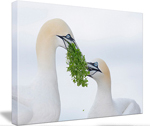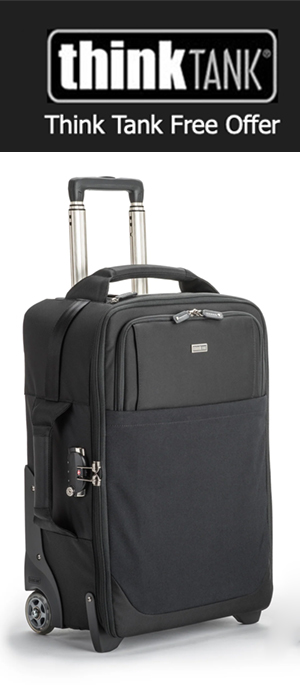Canon Telephoto Lens Specifications, Info, and Links; Bookmark This Page!
With so many great Canon telephoto lenses to choose from, so many just introduced, and a few more tantalizingly on the horizon, it can be difficult to find the data that you need to make informed choices. I have often spent more than an hour looking for the weight of this or that lens, searching for the minimum focusing distances of the various 300s, or converting grams to pounds and ounces or meters to feet. I spent the last two days, superbly assisted by Peter Kes, creating the table below. Be sure to bookmark the page as a favorite and visit it whenever you need some info on Canon telephoto lenses. In the past, I might have needed to do several online searches and visit two or three sites to come up with the info that is now at your fingertips in one neat package.
Notes: the active links take you to the B&H listing for the product. Purchase there to thank us for our efforts here and elsewhere. The inactive links are for discontinued lenses. The old 600, the 600mm f/4L IS, is actually discontinued but some remain in stock. We offer the weights in pounds and kilograms for the convenience of our many international visitors. MFD is the minimum focusing distance of the lens. We offer that in feet and meters, again for the convenience of our many international visitors. Magnif is of course the magnification of the lens at the closest focusing distance, the mfd. All of the lenses take one of three filters, a 67mm, a 77mm, or the 52mm drop-in filters (that go in the filter slots of the big lenses). Year indicates the year that the lens was first offered for sale.
Note: I strongly recommend against the use of skylight or other “protective” filters on any intermediate telephoto lens. They degrade image quality and often hamper autofocus accuracy.
You can find some additional helpful links in the text below the chart. Enjoy.
| CANON EF lens | D/” | D/cm | l/” | l/cm | wt/lb | wt/kg | mfd/ft | mfd/m | mag | filter | year |
|---|---|---|---|---|---|---|---|---|---|---|---|
| 200mm f/2.0 L IS | 5.0″ | 12.7cm | 8.2″ | 20.83cm | 5.6 lb | 2.5 kg | 6.23′ | 1.9m | 0.12x | 52mm drop-in |
2008 |
| 70-200mm f/4 L IS | 3.0″ | 7.62cm | 6.8″ | 17.27cm | 1.67 lb | 760g | 3.94′ | 1.2m | 0.21x | 67mm | 2006 |
| 70-200mm f/2.8 L IS II | 3.5″ | 8.89cm | 7.8″ | 19.81cm | 3.28 lb | 1.49 kg | 3.94′ | 1.2m | 0.21x | 77mm | 2010 |
| 70-200mm f/2.8 L IS | 3.5″ | 8.89cm | 7.8″ | 19.81cm | 2.9 lb | 1.31 kg | 4.9′ | 1.5m | 0.17x | 77mm | 2001 |
| 28-300mm L IS | 3.6″ | 9.14cm | 7.2″ | 18.29cm | 3.7 lb | 1.67 kg | 2.3′ | 0.7m | 0.3x | 77mm | 2004 |
| 70-300mm L IS | 3.5″ | 8.89cm | 5.6″ | 14.22cm | 2.31 lb | 1.05 kg | 3.9′ | 1.2m | 0.21x | 67mm | 2010 |
| 300mm f/4.0 L IS | 3.5″ | 8.89cm | 8.7″ | 22.10cm | 2.63 lb | 1.19 kg | 4.93′ | 1.5m | 0.24x | 77mm | 1997 |
| 300mm f/2.8 L IS II | 5.0″ | 12.70cm | 9.8″ | 24.89cm | 5.19 lb | 2.35 kg | 6.6′ | 2m | 0.18x | 52mm drop-in |
2011 |
| 300mm f/2.8 L IS | 5.0″ | 12.70cm | 9.8″ | 24.89cm | 5.63 lb | 2.55 kg | 8.2′ | 2.5m | 0.13x | 52mm drop-in |
1999 |
| 100-400mm f/4.5-5.6L IS II USM | 3.7″ | 9.40cm | 7.6″ | 19.30cm | 3.5 lb | 1.59 kg | 3.2′ | 97.54cm | 0.31x | 77mm | 2014 |
| 100-400mm L IS | 3.6″ | 9.14cm | 7.4″ | 18.80cm | 3.04 lb | 1.38 kg | 5.9′ | 1.8m | 0.20x | 77mm | 1998 |
| 200-400mm f/4L IS USM | 5.04″ | 12.80cm | 14.41″ | 36.60cm | 7.98 lb | 3.62 kg | 6.6′ | 2m | 0.15x 0.21x | 52mm drop-in |
2013 |
| 400mm f/5.6 L | 3.5″ | 8.89cm | 10.1″ | 25.65cm | 2.76 lb | 1.25 kg | 11.48′ | 3.5m | 0.12x | 77mm | 1993 |
| 400mm f/4.0 DO IS | 5.0″ | 12.70cm | 9.1″ | 23.11cm | 4.28 lb | 1.94 kg | 11.48′ | 3.5m | 0.12x | 52mm drop-in |
2001 |
| 400mm f/4.0 DO IS II | 5.0″ | 12.70cm | 9.1″ | 23.11cm | 4.63 lb | 2.1 kg | 10.83′ | 3.3m | 0.12x | 52mm drop-in |
2014 |
| 400mm f/2.8 L IS II | 6.42″ | 16.31cm | 13.5″ | 34.29cm | 8.49 lb | 3.85 kg | 8.89′ | 3 m | 0.17x | 52mm drop-in |
2011 |
| 400mm f/2.8 L IS | 6.42″ | 16.31cm | 13.5″ | 34.29cm | 11.85 lb | 5.37 kg | 8.86 ft | 3.7 m | 0.15x | 52mm drop-in |
1999 |
| 500mm f/4.0 L IS II | 5.75″ | 14.60cm | 15.08″ | 38.30cm | 7.04 lb | 3.19 kg | 12.14′ | 3.7m | 0.15x | 52mm drop-in |
2012 |
| 500mm f/4.0 L IS | 5.75″ | 14.60cm | 15.08″ | 38.30cm | 8.54 lb | 3.87 kg | 14.77 ft | 4.5 m | 0.12x | 52mm drop-in |
1999 |
| 600mm f/4.0 L IS II | 6.6″ | 16.76cm | 17.6″ | 44.70cm | 8.65 lb | 3.92 kg | 14.77′ | 4.5m | 0.15x | 52mm drop-in |
2012 |
| 600mm f/4.0 L IS | 6.6″ | 16.76cm | 18″ | 45.72cm | 11.83 lb | 5.36 kg | 18.04′ | 5.5m | 0.12x | 52mm drop-in |
1999 |
| 800mm f/5.6 L IS | 6.4″ | 16.26cm | 18.1″ | 45.97cm | 9.92 lb | 4.5 kg | 19.68′ | 6m | 0.12x | 52mm drop-in |
2008 |
For the complete Canon EF lens line-up click here.
For additional information on all Canon Super Telephoto lenses and teleconverters click here.
Questions
Lens questions are of course welcome. Please leave a comment if you wish to learn more.














Excellent chart, and I often refer to it 🙂
I did notice a minor error, the 70-200 2.8 IS and IS II have the mfd in metres around the wrong way, IS II should have the lower minimum focal distance of 1.2m (its listed as 1.5m) and older version should be 1.5m.
Thanks Alex. I have made the correction. artie
I dont have any idea what it would be worth now, the SSC FD lens seem to be more valued but in the interest of domestic tranquility I should not buy anything now. I just bought a 5D mark lll and use up any points I had on the home front for a while.
thanks Jim
Tell me more about the dinosaur 600 lens I maybe interested, I have accumlated some old photo equipment that still works
Jim
Hello Jim:
Thanks for asking. It was originally owned by a well-known eagle photographer from Vancouver Island who was one of Canon’s “elite” guys (like Artie) – can’t recall his name right now, but I am sure it will come to me. He was a retired RCMP officer and lived in Campbell River on the east coast of Vancouver Island in BC.
He was a very good flight photographer in his day. I am sure he would have been blown away now by the technical advances in photography equipment.
He used to buy his equipment in Winnipeg, Manitoba and I purchased this lens from a store there where was well-known. I paid $8,000 for it – it had been fully serviced and cleaned by Canon before being offered for sale there. I think this was in the mid eighties, and I was fairly new to photography, and loved photographing eagles. I was pretty successful and scored a contract with Sharpshooters Stock Agency in Miami based on my eagle photos, as well as other types of nature images. I had a very large number of my images included in their first nature catalog. They were later bought out by Corbis and alot of us quit the agency because we were unable to negotiate a decent contract with them.
I looked after the lens well, have a drop in polarizing filter for it-which was used very rarely. I have the trunk that it came in. I still use the lens occasionally, and carry it in a “Scope-Pack” that I got at around the same time. I have even photogaphed flowers with the lens as well as hummingbirds,[with multiple attachments].
I have back and knee problems now, so I don’t venture far from my car carrying that much weight. When photographing eagles in Squamish, BC, where I guided both Art Wolfe and George Lepp to my favorite locations, I would sometimes carry the 600 in the scope pack on my back, and a back-pack with my other gear slung in front of me…..as well as my tripod with the Wimberly head! Upon reflection, it is no wonder that I wrecked my body – or maybe it was the skiing 100 days a season, when I lived in Whistler!
Rambling on here, but that is the history of my 600mm lens. I have no idea what it is worth now – though I saw in one of the posts that someone had paid $1500 for one on ebay at some point.
Let me know if you need any more information.
Cheerio
Carol
Artie , this is A great chart and what I like best is you have included ALL of the OLD Lenses
in this chart for comparison to ALL of the NEW Lenses and I might add useing the Kenko 36 mm
extension tube with our beloved 400 f 5.6 ( the toy Lens ) it will focus @ 6.5 feet this is
for doing Butterflies when I am out on the trail .
Hi Arthur!
This is indeed a very educational and informative chart! I will be coming back often when needing to know more about the different Canon lenses. Thanks a ton for your continuous support.
Another fan of the beginner’s birding lens, the 400mm f/5.6. I have taken near-zenith photos with a one-handed grip – the lens is so light and balances so well. Now I won’t fib – I do have lens envy for some of the longer lenses with larger apertures and thus room for a TC without losing autofocus. The 400mm f/5.6 is so easy to take hiking, along with a monopod, and it is a joy to locate new birding spots and get good shots at the same time.
Hey, I was the early champion of the 400 f/5.6, my beloved “Toy Lens.” But today, the 300 f/4L IS is the better choice by far. It is a bit lighter, faster, has Image Stabilization, kills the 400 f/5.6 on close focus, and offers greater flexibility as it will autofocus with a 1.4X teleconverter with any camera body.
Mr. Morris, I was referred to your site by a mutual friend, Milton B., and I am glad he did, very informative chart. I have a question, do you think I should use a quality polarizer on my Canon 100 – 400 for wildlife and water birding in bright sun?
I would advise against that. I have used a warming circular polarizer only to be able to achieve very slow shutter speeds when creating pleasing blurs. See A Guide to Pleasing Blurs.
Thanks, Artie. If I click on the link you provided to the 25mm extension tube and buy it there, does BAA get credit?
Yes sir. All active links for gear that we do not carry are BAA B&H affiliate links. Thanks for asking.
Very useful. However, one small critique. The aperture values were not included for the telephoto zoom lenses. My guess is that occurred due to space/size limitations of the chart. Just, given the purpose of this tool, it would have been handy.
Cheers,
Jay
You are correct. And I do not like variable aperture lenses. The info is available by clicking on the active links for those lenses.
What? My 600 F4 non-IS didn’t make the list, lol…Bought that old dinosaur in 2006 for $1500 off Ebay.
I swear I’m the only one using this lens 🙂
Just in case there’s anyone else from the Dino Club, I think these are the specs…
Year – 1988
MFD – 19.69 feet
Magnif – .11
Filter Diam – 48
Weight – 13.23 pounds
And yes, I’m still lugging this thing around 🙂
Doug
Oh, and if anyone else is interested, check out Canon’s Lens Museum for even more specs…
http://www.canon.com/camera-museum/camera/lens/index.html
OK, back to the 21st century.
Doug
13.28 pounds. Nice! Compare that with the weight of the new 600…
I’ve got one of those monsters and the sore sholder from hauling it around. (69 years old)
Thank you! Do you know if the 100-400mm L IS is scheduled for an update this year?
Nope. That rumor has been around for years. Nobody knows what gives with the 200-400 IS with the built-in 1.4X TC….
Excellent chart Artie! easy to follow and all the information in one
place. A big hello from India!
Namaste bhai! Glad that you got home safely; that jet lag can be brutal…. And thanks. artie
Excellent chart. Easy to read and compare!
Many thanks Lady D.
Thanks, Artie, a very useful list – also obviously a lot of work!! Now all I have to do is to start saving. I must admit I am very impressed with my new 70-200 f2.8 Mk11. Sorry I could not purchase through your B&H link but the British Customs duty, VAT etc. would have pushed it out of reach.
YAW Melvin. You might very well be wrong about the costs of importing photography gear. Best to e-mail me and request the B&H Landed Cost Calculator PDF. There prices are so low that even with the duties and VAT included they can off save you money. And you know exactly what it will cost to get the goods to your doorstep before you order.
Thanks for the chart, Artie!
Wow, Artie, that’s really a nice chart. Thank you.
You know, I’m continually amazed by how well the ancient 400 mm f/5.6L stacks up. It’s the oldest lens on your chart (and I know just how it feels!) It’s so light and focuses incredibly fast; if it weren’t for its atrocious minimum focus distance of 3.5 meters I’d have no complaints at all.
YAW. That’s why God invented the EF 25mm extension tube; never leave home without it!
ps: you want atrocious? The old FD manual focus 800mm f/5.6 lens had a mfd of 45 feet!